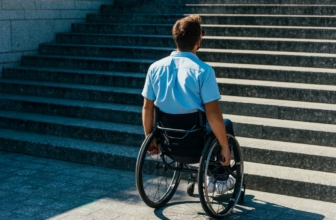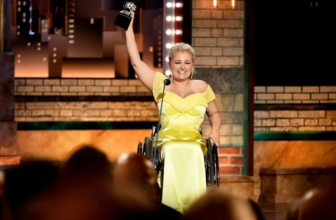As we discussed in part one of this series, making the decision to go to grad school is not one to be taken lightly under any circumstance. But doing so as a person with a disability (PWD) can be especially difficult to decipher. Scouring the Internet, the scarce resources I found were message threads and pages by universities outlining the accommodations they provide their students; while I received general support on how to complete a graduate degree, I would have appreciated some guidance on how to do so successfully from a disability perspective. The following is meant to decode the STEM Ph.D.* program trajectory, providing some tips on how to navigate the often tortuous (for good or for bad) path to a degree.
* While the majority of this article is written with the Ph.D. in mind, there is some degree of generalizability that applies to many doctorate degrees (at least at the level discussed here).
Meet the Contributors
Raisa Rahim is a fifth-year Ph.D. candidate and National Science Foundation Graduate Research Fellowship Program (NSF GRFP) fellow, studying cognitive neuroscience at University of California, Davis. After having a stroke, she uses a power wheelchair and has a speech disability. She is committed to enhancing the principles of diversity, equity and inclusion in academia and beyond through effective science communication.
Yannis Tevissen is a 25-year-old French engineer. He graduated from Telecom SudParis in 2020. He is now preparing a Ph.D. in AI speech technologies at the Polytechnical Institute of Paris in partnership with the company Newsbridge. Yannis has spinal muscular atrophy, a motor disability affecting his strength and movements.
H'Sien Hayward, Ph.D. obtained her doctorate in psychology at Harvard University, where she was an NSF GRFP fellow. She then completed a postdoctoral respecialization in clinical psychology at the California School of Professional Psychology in San Francisco, CA. Due to a spinal cord injury that resulted in paralysis from the chest down, she has used a manual wheelchair for nearly 3 decades. She is also dedicated to disability advocacy, speaking at and organizing briefings on ableism at the United Nations and doing humanitarian work in countries such as Mongolia, Costa Rica, Thailand, and Rwanda.
Cara Hrycyk is a third-year student in a Psy.D. program in Clinical Psychology at Northern Arizona University, where she is completing a practicum at an inpatient treatment center for substance use disorders. She is currently serving as student government diversity coordinator. She has a spinal cord injury and is paralyzed from the chest down.
This guide will first give generic advice for any grad student in a normal font, followed by tips outlined by contributors specifically directed toward managing these processes with a physical disability in italics.
1. Set yourself up for success in your doctorate program.
As with applying to graduate school, organization is a critical skill for getting through the degree. Take advantage of technology (i.e. the Google Suite, Mendeley) to streamline your work. Grad school is about juggling a variety of tasks – determine what times of the day you are most productive at each task.
RR: Get set up with your campus’s student disability center as soon as possible (even before your first term, if you can). Be your own best advocate – the reality of things is that the academic infrastructure was not built with accessibility in mind, so it is up to invested individuals and allies to strive for equity for ourselves and future students. Remind administrators that it is in their best interest that you get what you need to do your best work for them. Check if you have access to supplemental funding sources specifically designed to support people with your identities (i.e. internal and external fellowships).
YT: As a disabled student, the main issues I faced … were mobility issues. Buildings, classrooms, and especially [lecture halls] are often not [designed with] disabled students [in mind]. Doors are not easy to open, there are no appropriate seats and when there are, you are often forced to be far from your classmates. When a building is inaccessible, you can often ask to relocate or … attend online. All these issues often have solutions but it takes time and energy [to self-advocate], which is a precious asset when you study hard.
2. Set deadlines for yourself.
Keeping degree requirements in mind, continuously set SMART goals for yourself. Given the number of large (and often initially nebulous) tasks that need to be completed in order to complete the doctoral degree, prioritize and triage tasks on a daily basis. Most importantly, take things one step at a time – break big tasks into bite-size chunks with feasible, self-imposed deadlines.
RR: Check with your program how your timeline looks on a regular basis, making sure that everyone is on the same page if you need an alternate time scale compared to your peers. Strategies that have helped me are: 1) creating outlines/ spreadsheets with major milestones and deadlines, 2) hyper-blocking my schedule by breaking these milestones into manageable parts, leaving ample empty time to account for the extended time it takes me to travel, etc. Laying things out like this is incredibly useful in managing anxiety from the sometimes overwhelming amount of work that needs to be done. To mitigate my difficulties with reading and memorization, I use the Claro Suite and Chegg/ Quizlet online flashcard apps, respectively.
HH: [A great way to] balance time between work and life is to work with friends. I wrote my dissertation at coffee shops with others who were at the same stage – I finished it two months early! My best advice for writing it: touch it (in some way) every day so you don’t lose momentum.
CH: Stay on track with reading assignments and have a study schedule. Create a calendar for your entire program and one each semester to manage your time most efficiently. Find out when difficult tasks, such as comprehensive exams, will be held, so you can give yourself enough time to prepare for them. Each semester, write down the dates major assignments and papers are due for each class to determine when you should start working on them so you don’t get overwhelmed.
3. Mentor up.
It is not practical for any one PI to fulfill all of your mentoring needs. Seek out multiple mentors, each with their own specific sets of skills, to cover all your bases. Nurture a support group amongst your peers – no one understands your struggles better than others in the trenches with you.
RR: When choosing a lab, be sure to spend enough time with your potential PI and lab mates to ensure that you will receive sufficient interpersonal support. Having a supportive work environment is crucial – not having your full self be acknowledged exerts unnecessary stress that will likely affect your performance. Reflect on your priorities: is it more important that you study a particular topic? Does your communication style align with those in the lab? In our first year, my cohort and I took a series of courses together; being from diverse academic backgrounds, we each used our strengths to support the group. I fostered this team-building mentality by offering my apartment to my cohort as a convenient centralized study hub in our first year. As this increased my ability to participate (since I didn’t need to travel as much), I was able to build strong bonds within the group that have had lasting impacts both personally and academically.
HH: Mentors don’t always have to be “higher” in the academic hierarchy. Find community with other students with disabilities for support, fun, and allyship when challenges arise. While they can act as a sounding board, they can also help you strategize [for how they navigated a similar situation when issues arise]. Faculty and staff allies are very helpful [in serving as middlemen when institutional issues come up, so nurture these relationships].
CH: It is very important to advocate for what you need – don’t assume [anyone else knows] what you need. I’ve been offered TAships, etc. [because the faculty] look out for me. Let peers know you want to be involved and look for opportunities to join clubs, volunteer, etc. Mentors do not have to be affiliated with your university. I found [mine] through a program offered by a professional organization.
4. Choose your own adventure.
One of the best parts of grad school is having the flexibility to forge your own path. Regularly check in with yourself and your advisory committee about whether your academic train is on the track you want it to be on. Find the courage to pivot your direction if things aren’t working for you; it is better to start fresh than to force something that is not fruitful. Keeping an eye trained on the next thing is a good way to maintain forward momentum when grad school sometimes feels like running in circles. Given your goals post-degree, strategize which skills you want to focus on developing (e.g. writing, mentoring an undergraduate researcher, presenting at conferences) and find your community on campus. A meaningful way to decompress from school is through service. Depending on your personal passions (e.g. student government, diversity committees, science communication collectives), you can build your transferable task organization, time management, financial budgeting, and interpersonal communication skills.
RR: Given that the Ivory Tower is notoriously uninhabitable to minoritized populations, especially people with disabilities, craft your experience to suit your future goals either in academia or not. Honing your transferable skills makes you a well-rounded candidate, whether you stay in or pursue a different direction with your degree. Through strengthening these extracurricular skills (via taking classes on how Ph.D.s can transition out of academia, serving on diversity committees, etc.) and a supportive thesis committee, I was able to reframe my research to more closely align with my overarching goals as my priorities shifted.
HH: Professional development was fulfilling and gave balance [to my work]. I served on DEI committees, gave a UN briefing on disabilities, and volunteered with humanitarian organizations (working with people with disabilities).
5. Celebrate your Ws!
Rewarding yourself (within measure) as you finish tasks increases motivation to keep going, whether you’re simply checking a box on your to-do list or treating yourself to enjoy a favorite hobby. This is especially important, as the light at the end of the tunnel may look impossibly distant at times. Take stock of your achievements, committing them to memory to retrieve on a rainy day.
RR: Breaking large tasks into smaller, manageable tasks gives you a greater “hit rate”, as the reward for finishing one task is often simply moving on to the next. Because my brain doesn't always want to remember my accomplishments, I write them in my journal when they do occur. Regularly updating your résumé also helps you see your progress.
CH: I celebrate the end of every semester by going out to dinner with my family. Take a moment to celebrate the small things, such as finishing a difficult project, and recognize that you are making progress.
6. Learn from your Ls.
Graduate school is a roller coaster, a seemingly endless series of highs and lows. Trust the process and hold your reason for entering graduate school at the top of mind as a reminder that there is a purpose for your hard work. Especially early on, a seeming lack of progress can be incredibly demoralizing; though this can be difficult, try to compartmentalize academic success from self-perceptions of your merit as a scientist.
RR: Internalize that academic success does not define your worth as an academic. You belong in any space you wish to be in; if something is not working despite your best efforts, it is likely an indication that the systems you are entangled in were not built with you in mind. PWD are forced to be problem-solvers – use these skills to find ways around obstacles you face. As scientists, we should always be open to what the data are telling us. A pivot is not a failure to complete a line of work; a pivot is a realignment of your work to your current thought processes.
CH: Try not to get discouraged when you face obstacles. Remember you are in the graduate program because you have the skills necessary to succeed. If you are having difficulty, don’t be afraid to reach out. Discuss your needs with professors or other students.
7. Make yourself a priority.
Graduate school is incredibly emotionally taxing, where students are often expected to work far beyond their pay rate. Though deadlines are cyclical so a work-life balance is not always achievable, a full night’s rest should be strived for – a rested mind is a productive mind! Take advantage of services available on campus or in your community, whether they be mental health resources, the gym, or fun craft classes – whatever medium helps you cope!
RR: Imposter syndrome is rampant among graduate students due to a variety of factors woven into the academic culture; being from a minoritized group only compounds this issue. Though mental health resources are woefully inadequate at most universities, I would encourage you to keep trying to access them. Seek out services on campus and beyond. Keep ahold of your non-academic support system – when you feel your grad school outcomes are low, it is invaluable to be able to turn to someone outside the system for some perspective. At the same time, lean on your peers to both commiserate and strategize ways forward.
CH: Self-care isn’t always easy when you are in graduate school, but it is extremely important. Eat healthy foods, exercise regularly, practice good sleep habits, take breaks when needed, and make time for activities you enjoy. [You’ll find it comes back to benefit your work!]
Takeaways for Ph.D. Students with Disabilities
Identify and capitalize on low-hanging fruit.
As my undergraduate PI said, “Grad school is hard enough [on its own, so minimize barriers for yourself whenever possible]”. From an equity perspective, everything should be accessible (but in reality, it isn’t). Take stock of the skills you came into grad school with, those you want to build on for your career, and strategize the easiest way to bridge the gap between the two.
There is no one way to do graduate school.
Graduate school’s purpose is to support students as we enhance our critical thinking skills, gaining countless transferable skills as we go. Periodically check in with yourself that your progress is reflecting your aspirations. Whether you are redirecting the focus of your thesis work or choosing an alternate career track other than academia, the ball is in your court. Surround yourself with people who can similarly think out of the box.
Put your well-being first as a doctoral student with a disability.
Try to organize your life with your physical and mental health at the forefront. A healthy body and mind beget a healthy body of work. people with disabilities have been socialized to think of ourselves as a burden, and that providing equity is an act of institutional generosity. It’s not – it is a basic human right. Make space; take space
Image by GoodLuz via Deposit Photos
Raisa Rahim is a fifth-year Ph.D. candidate and National Science Foundation Graduate Research Fellowship Program (NSF GRFP) fellow, studying cognitive neuroscience at University of California, Davis. After having a stroke, she uses a power wheelchair and has a speech disability. She is committed to enhancing the principles of diversity, equity and inclusion in academia and beyond through effective science communication.







